In the evolving landscape of cannabis legalization across the United States, an interesting distinction emerges in the form of non combustion states. These are jurisdictions that have taken a unique approach to regulating the consumption methods of cannabis, particularly for medical patients. Non Combustion states mandate that cannabis must not be smoked; instead, they allow for alternative methods such as vaporization, and in some cases, even this method is restricted.
As we navigate through this intricate web of regulations, our focus will be on identifying the states where combusting cannabis is prohibited and introducing our innovative solution, the iven® dry herb vaporizer device. Designed for states where its use aligns with local laws, the iven device offers a compliant way for patients to benefit from their medical cannabis. Join us as we delve into the list of non combustion states and explore how technology like the iven dry herb vaporizer is reshaping the experience of medical cannabis consumption in these regulated environments.
What is Non Combustion?
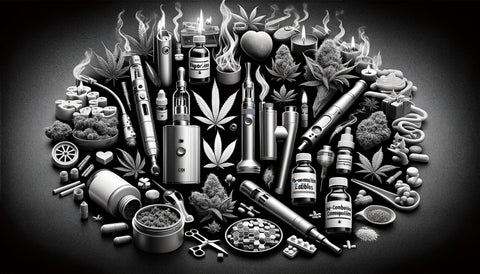
Non Combustion refers to methods of consuming cannabis that do not involve burning the plant material to release its active compounds. Unlike traditional smoking, which combusts cannabis at high temperatures, non combustion techniques such as vaporization heat the cannabis just enough to vaporize cannabinoids and terpenes without igniting the plant. This approach allows for the inhalation of vapor rather than smoke, offering a different consumption experience.
Non Combustion methods are distinguished by their ability to deliver the desired effects of cannabis while avoiding the byproducts of combustion, which can include harmful toxins and carcinogens. States or jurisdictions that mandate non combustion methods for cannabis consumption typically do so to regulate how medical cannabis patients can use their medication, focusing on alternatives that avoid the risks associated with smoking.
Alabama
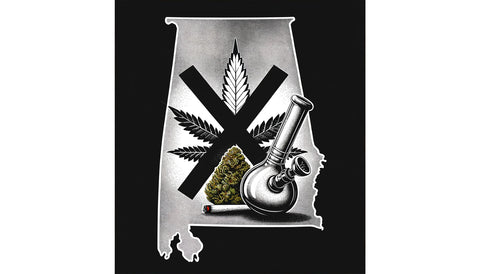
The first non-combustion state we will cover is Alabama. In this southern state, the journey towards legalizing cannabis for medical purposes took a significant leap forward with the signing of Senate Bill 46 in 2021 by the Governor, marking the inception of medical cannabis legality in the state. This pivotal legislation, known as the Darren Wesley ‘Ato’ Hall Compassion Act, delineated a framework for legal cannabis access for patients suffering from specific qualifying medical conditions. Under this Act, Alabama initiated a medical cannabis program, allowing individuals aged 19 and older with certain medical conditions to legally purchase and use cannabis. Furthermore, the Act necessitated that qualifying patients obtain a state-issued medical cannabis card to acquire medical cannabis from licensed dispensaries, ensuring a regulated and safe framework for its medicinal use. However, it's important to note that the consumption of cannabis-infused edibles and smokable cannabis flowers remains prohibited for registered cannabis patients in Alabama, highlighting the state's cautious approach towards the consumption methods of medical cannabis.
Florida
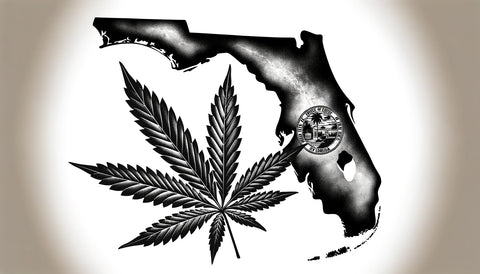
Florida is the first of two states on our list where combustion of cannabis was once banned but now is legal. The origin state of the “Florida Man” memes has seen significant changes in its cannabis legal landscape as a reflection of the broader shift in attitudes towards medical cannabis across the United States. Initially, the state's medical cannabis laws were restrictive, catering only to terminally ill patients with less than a year to live. However, the approval of the Florida Medical Marijuana Legalization Initiative, also known as Amendment 2, in the 2016 general election marked a pivotal moment. This amendment expanded the scope of medical cannabis to include a wider range of debilitating medical conditions such as cancer, epilepsy, glaucoma, HIV/AIDS, PTSD, ALS, Crohn's disease, Parkinson's disease, multiple sclerosis, and other comparable conditions. The amendment's passage, requiring a supermajority vote of at least 60%, showcased Florida voters' support for broader access to medical cannabis.
Despite the expansion of medical cannabis access, the initial legislation explicitly excluded the smoking of cannabis as a permissible form of consumption, a decision that was met with legal challenges. Notably, Orlando trial lawyer John Morgan, a key figure in the amendment's campaign, filed a lawsuit against the state's prohibition of smoking medical cannabis, arguing that it contradicted the voters' intent and the amendment's provisions. In 2018, this legal battle reached a turning point when Leon County Circuit Court Judge Karen Gievers struck down the smoking ban, ruling it unconstitutional and affirming that the amendment allowed for the smoking of medical cannabis in private. This court decision effectively transformed Florida in 2019 from a non-combustion state to one that recognizes the smoking of medical cannabis as a right protected under the amendment, significantly impacting the state's medical cannabis landscape and patient access to treatment.
Minnesota
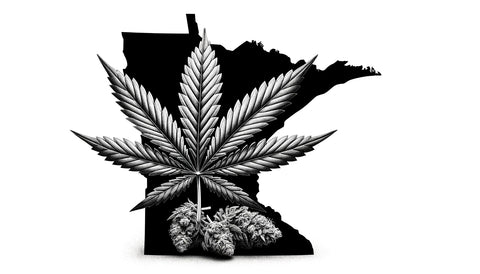
Our next state, Minnesota, is the second state to enter the medical cannabis market initially barring combustion as a mode of consumption. In the state, the landscape of cannabis legality has undergone significant transformation, especially with the pivotal amendments in 2022 that marked a new era for cannabis use within the state. Initially, medical marijuana found its legal footing in 2014 when Governor Mark Dayton sanctioned the Minnesota Medical Cannabis Act, laying the groundwork for the Medical Cannabis Program under the Minnesota Department of Health (MDH) purview. This legislation meticulously outlined the conditions under which medical cannabis could be utilized, targeting a list of specific medical conditions and introducing a regulated framework for access. Furthermore, in an effort to expand the accessibility and forms of medical cannabis, the state legislature in 2021 passed a bill to legalize the use of whole-plant (flower) cannabis for medical purposes, a significant step towards enhancing patient options and accessibility.
2022 witnessed further legislative evolution with notable amendments aimed at broadening the scope and ease of medical cannabis use. Among these changes, Minnesota underwent a significant policy shift regarding cannabis consumption. Previously characterized as a non-combustion state where the smoking of cannabis, even for medicinal purposes, was prohibited, Minnesota has now moved towards legalizing cannabis for adult-use recreational purposes. This transition was marked by the approval of bills by both the Minnesota House and Senate, signaling a move towards a more liberal stance on cannabis consumption. This change not only reflects the state's evolving perspective on cannabis but also aligns Minnesota with a growing number of states adopting more progressive cannabis policies. The move to legalize cannabis for recreational use marks a departure from the state's previous restrictions and opens up new avenues for cannabis consumption, including the option for combustion, thereby transitioning Minnesota from a non-combustion to a combustion state in 2022.
Pennsylvania
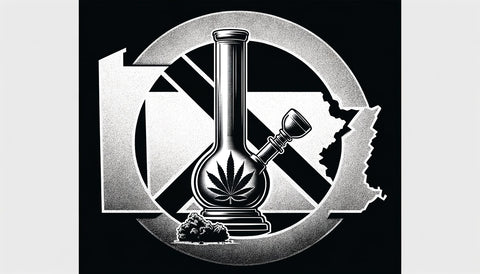
In Pennsylvania, the use of marijuana is strictly regulated under medical purposes, with recreational use remaining illegal as of 2023. The Medical Marijuana Act, enacted on April 17, 2016, by Governor Tom Wolf, legalizes marijuana for medical use but sets clear boundaries for its possession, consumption, and cultivation. Only patients with a valid medical marijuana card, prescribed by registered physicians for specific qualifying conditions, are allowed to use cannabis. Additionally, minors requiring medical marijuana must do so through registered caregivers, highlighting the state's cautious approach towards cannabis consumption. The act stipulates that patients may possess up to a 90-day supply, as recommended by a pharmacist, but cultivating marijuana for personal or medical use without a proper grower/processor license remains illegal. Along with stipulations regarding the size of a patient’s supply, medical cannabis users are prohibited from igniting dry cannabis flower with a flame to consume. This strict regulation underlines Pennsylvania's stance as a non-combustion state, requiring patients to consume flower with a vaporizer, nebulizer, or other similar device.
Efforts to legalize recreational marijuana have seen some progress, notably with the introduction of SB473, aimed at creating a regulatory framework for its legal use. Despite the lack of current legal backing for recreational cannabis, cities like Philadelphia and Pittsburgh have taken steps to decriminalize small possession amounts, indicating a potential shift towards more liberal policies. The Pennsylvania Senate's move to expand medical marijuana use to include edibles, and the ongoing discussion around Senate Bill 846, suggest a gradual opening towards broader cannabis acceptance. However, Pennsylvania remains a state where the combustion of cannabis, recreational use, and unauthorized cultivation are prohibited, reflecting a cautious approach to integrating cannabis into society while exploring the boundaries of medical application and potential future legalization of recreational use.
Utah

In Utah, the legality of cannabis is clearly defined under the state's medical marijuana program. Individuals can legally possess marijuana if they hold a valid cannabis patient card, procure it from an authorized pharmacy, and adhere to the limitation of not having more than a 30-day supply in the proper dosage form. To qualify for a medical cannabis patient card, applicants must be at least 21 years old and receive a recommendation for medical marijuana use from their medical provider. For those aged between 18 and 20, an additional endorsement from the Compassionate Use Board is necessary. Possession of marijuana without a patient card is illegal, classified as a class A misdemeanor, which could result in up to 364 days in jail and fines up to $2,500. More severe penalties apply for possessing 100 pounds or more of marijuana, elevating the offense to a second-degree felony with potential prison time of up to 15 years and fines up to $10,000.
Utah is notably a non-combustion state concerning the use of medical cannabis. Despite allowing the possession and use of marijuana for medicinal purposes by cardholders, the state prohibits smoking cannabis. Permitted forms of consumption include capsules, concentrated liquids, and aerosols, among others. However, combustion or smoking of marijuana is considered an infraction for cardholders, punishable by fines up to $100, and repeated offenses escalate to a class A misdemeanor. Vaping, distinct from smoking under Utah law, remains a permissible method for using marijuana. This legislative framework underlines Utah's cautious approach to medical cannabis, emphasizing controlled, non-combustible consumption methods while providing therapeutic benefits to those in need.
West Virginia
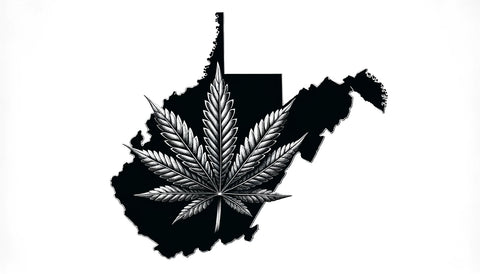
In West Virginia, cannabis is legal solely for medical purposes, with recreational use strictly prohibited. The state legalized medical marijuana in 2017 through the passage of Senate Bill 386, thereby establishing the West Virginia Medical Cannabis Act. Under this legislation, individuals diagnosed with certain debilitating medical conditions are eligible to purchase medical cannabis, provided they are registered with the West Virginia Medical Cannabis Program. However, the state imposes strict regulations on how medical cannabis can be consumed and distributed. For example, patients are not allowed to cultivate their own cannabis at home, and the sale of marijuana edibles remains illegal. This framework ensures that only state-licensed medical cannabis dispensaries can distribute cannabis to qualifying patients, emphasizing the controlled and medical-centric approach to cannabis use in West Virginia.
West Virginia, traditionally a non-combustion state for medical cannabis, has been navigating a significant shift with the introduction of House Bill 2267. Under the existing West Virginia Medical Cannabis Act, the sale and consumption of cannabis in edible form are prohibited, restricting available forms of medical marijuana to tinctures, oils, topicals, pills, liquids, dermal patches, and forms suitable for vaporization, excluding dry leaf or plant form. This legislation underscores a cautious approach, allowing medical cannabis consumption while strictly regulating its forms to ensure medical suitability and safety.
House Bill 2267, introduced by Delegate Pushkin on January 11, 2023, proposes amendments to §§16A-3-2 and §16A-3-3 of the Code of West Virginia, aiming to authorize the possession and smoking of medical cannabis by approved persons. This bill marks a pivotal step towards liberalizing the state's cannabis policies by potentially legalizing the smoking of medical cannabis, thereby expanding the ways in which patients can consume their medication. If passed, this legislation would align West Virginia with a growing number of states recognizing the therapeutic benefits of cannabis and the importance of providing patients with various consumption methods to meet their specific medical needs. This legislative effort reflects a broader trend towards embracing cannabis for its medicinal properties and represents a significant stride towards compassionate healthcare practices.
A New Device for Non Combustion States and Beyond

The iven™ device by E10 Labs is a groundbreaking innovation in the realm of cannabinoid delivery systems, designed to optimize the consumption experience without the harmful effects of combustion. Our state-of-the-art dry herb vaporizer is engineered to heat flower contents to their ideal temperatures, thereby releasing cannabinoids efficiently while avoiding the carcinogens typically produced by burning. It's an ideal solution for those seeking an alternative to traditional smoking methods, particularly in non-combustion states where regulations around cannabis consumption are strict.
Featuring an aluminum finish, gunmetal color, and a push-button design, the iven™ is as stylish as it is functional. It offers four temperature settings, allowing users to customize their experience according to their preferences. The device's battery capacity stands at 880mAh, with a voltage range from 3.2V to 4.2V, ensuring a long-lasting and satisfying session. The Type-C charging port and a compact length of 4.29” make it both portable and easy to maintain. Moreover, we have made this device accessible to everyone, offering shipping to all states, including those with non-combustion cannabis laws. This makes the iven™ a cost-effective, legal, and innovative option for cannabis users in states with stringent regulations, providing them the freedom to enjoy the full benefits of their chosen flower or dry leaf in a more health-conscious manner.
Conclusion
In the intricate tapestry of America's cannabis landscape, non-combustion states stand out for their innovative approach to medical cannabis consumption, paving the way for alternatives to traditional smoking methods. The iven® dry herb vaporizer device emerges as a beacon of innovation in this evolving narrative, offering patients in these states a compliant and efficient way to access the therapeutic benefits of cannabis without the harmful effects of combustion.
As we've journeyed through the regulations and nuances of these states, it's clear that technology like the iven® is not just adapting to the current legal frameworks but is also shaping the future of cannabis consumption. By providing a solution that aligns with both the letter and spirit of the law, we here at E10 Labs are at the forefront of a movement towards creating devices that can legally be used in non combustion states and beyond. As regulations continue to evolve, devices like the iven® will undoubtedly play a pivotal role in providing a sublime dry herb vaporizer experience to users in both combustion and non combustion states.



